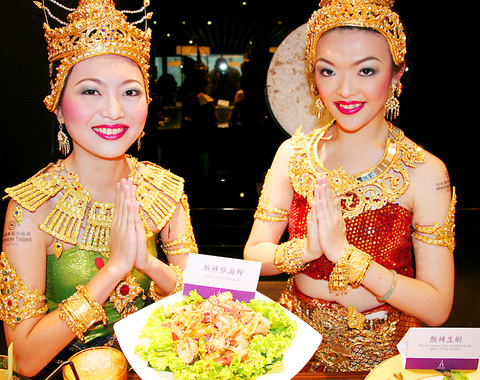Chef James Lin (林作煜) was taking a stroll around Bangkok when he came across the floating markets and noticed locals were addicted to a zesty appetizer that involved wrapping a variety of spices in banana leaves.
“I was really searching for food that nobody else in Taiwan was serving up,” said the Sheraton Taipei's chief executive chef, who has been honing his culinary skills in the US and oversaw the menu at the hotel's newly opened Sukhothai restaurant.
The spices — shallots, dried shrimps, coconut, chili, lime, young ginger, green mango, roasted peanuts and a sugar cane-based mieng sauce — are folded in a leaf and eaten raw. One can change the amount and combination of spices to personalize the dish, but either way it's a taste sensation.

PHOTO: JULES QUARTLY, TAIPEI TIMES
Though Lin has substituted spinach for banana leaves in what he calls the South Sea salad roll, the other 58 dishes presented at Sukhothai mostle rely on imported ingredients from Thailand.
This means that traditional Thai dishes, which are often augmented in local restaurants so they taste like Chinese food, get a fresh lease on life. The original flavors of classics such as tom yum gung (sweet and sour shrimp soup) renew one's faith in the power of food to surprise and delight.
Joining Lin in providing authentic tastes is chef Phonlaphat Sudsaidee, from northeast Thailand, who has combined tradition and creativity to produce food rarely encountered here.
We were served what is called the khantoke sampler platter, consisting of nine small dishes, all of which have a unique flavor but nevertheless complemented each other. The som tam (green papaya and shrimp salad) came with a tart lime dressing and was eaten with rice that was pressed in the hand, traditional Thai style.
The meal came to a conclusion with Thai sweet rice and mango, and flour pastry with water chestnuts and sweet coconut cream. Sukhothai, by the way, means “golden dawn” and was the Kingdom of Siam's first capital in the 13th century.
Until Aug. 31 guests are offered a free appetizer of kratong thong (minced chicken tartlets) and ice fruit tea. Also, go to www.sheraton-taipei.com and download a coupon for one free dessert.
Thai food doesn't get much better than this, even in Thailand. And now is the time to visit.

Google unveiled an artificial intelligence tool Wednesday that its scientists said would help unravel the mysteries of the human genome — and could one day lead to new treatments for diseases. The deep learning model AlphaGenome was hailed by outside researchers as a “breakthrough” that would let scientists study and even simulate the roots of difficult-to-treat genetic diseases. While the first complete map of the human genome in 2003 “gave us the book of life, reading it remained a challenge,” Pushmeet Kohli, vice president of research at Google DeepMind, told journalists. “We have the text,” he said, which is a sequence of

On a harsh winter afternoon last month, 2,000 protesters marched and chanted slogans such as “CCP out” and “Korea for Koreans” in Seoul’s popular Gangnam District. Participants — mostly students — wore caps printed with the Chinese characters for “exterminate communism” (滅共) and held banners reading “Heaven will destroy the Chinese Communist Party” (天滅中共). During the march, Park Jun-young, the leader of the protest organizer “Free University,” a conservative youth movement, who was on a hunger strike, collapsed after delivering a speech in sub-zero temperatures and was later hospitalized. Several protesters shaved their heads at the end of the demonstration. A

In August of 1949 American journalist Darrell Berrigan toured occupied Formosa and on Aug. 13 published “Should We Grab Formosa?” in the Saturday Evening Post. Berrigan, cataloguing the numerous horrors of corruption and looting the occupying Republic of China (ROC) was inflicting on the locals, advocated outright annexation of Taiwan by the US. He contended the islanders would welcome that. Berrigan also observed that the islanders were planning another revolt, and wrote of their “island nationalism.” The US position on Taiwan was well known there, and islanders, he said, had told him of US official statements that Taiwan had not

We have reached the point where, on any given day, it has become shocking if nothing shocking is happening in the news. This is especially true of Taiwan, which is in the crosshairs of the Chinese Communist Party (CCP), uniquely vulnerable to events happening in the US and Japan and where domestic politics has turned toxic and self-destructive. There are big forces at play far beyond our ability to control them. Feelings of helplessness are no joke and can lead to serious health issues. It should come as no surprise that a Strategic Market Research report is predicting a Compound